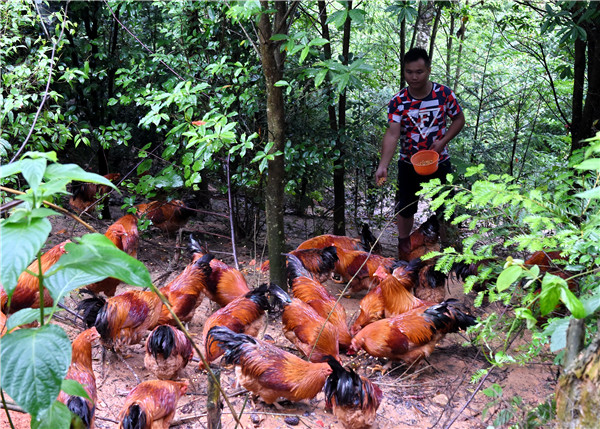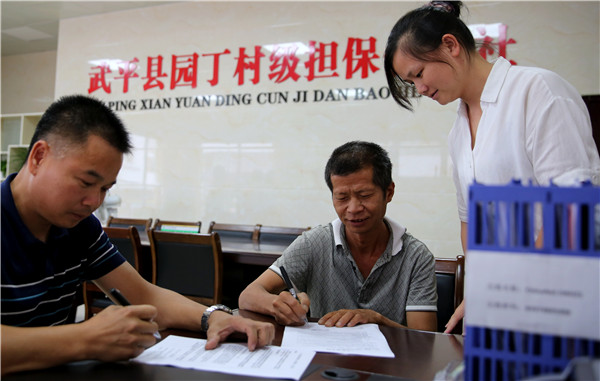Residents benefit in quest for a brighter future
China Daily by Hou Liqiang and Hu Meidong, July 11, 2017 Adjust font size:

The lives of people in one region of Southeast China have been boosted by an unorthodox approach to poverty alleviation that has seen pioneering reform of the collective ownership system for woodland, Hou Liqiang and Hu Meidong report from Wuping county, Fujian province.
In 2001, Wuping county, Fujian province, pioneered reform of the collective ownership system for woodland, and reaped great rewards by allocating forestry assets to individual families.
The county's experience is now being promoted nationwide and reform is continuing. In the latest round, the county government has been instrumental in establishing village cooperatives that help farmers to secure loans and start businesses related to the forestry sector.
Although it is against regulations for cooperatives to offer credit guarantees, some officials are prepared to turn a blind eye and satisfy demand from local residents.
In 2015, Zhong Xinwen wanted to expand his plant nursery. However, he owned very few forestry assets so the only way he could obtain a loan was to find four people, including two public servants, who would offer credit guarantees on his behalf. After spending three months visiting all the public servants he knew or had ever been introduced to, Zhong only managed to find one person who was prepared to help.
The 51-year-old resident of Yuanding village in Wuping despaired, and was on the verge of abandoning his expansion plans when he heard that a bonding cooperative was being set up in the village that would provide credit guarantees for loan applicants.
Zhong was delighted to find that the cooperative made his life easier by arranging a 100,000 yuan ($14,680) loan in less than a week and that only one person would be required to use their forestry assets as collateral for his venture.
The money he received allowed Zhong to expand his nursery by nearly 3 hectares, which helped raise his income "by a substantial amount".

Credit guarantees
Zhong is one of nearly 300 farmers the cooperative has helped to obtain loans. It was established as a result of a guideline issued by the county government in 2015 that was aimed at encouraging bonding cooperatives to be set up in rural areas.
Under the guideline, the Wuping government gives cooperatives 10,000 yuan to cover operating expenses, and the equivalent of 1 to 2 percent of the value of each loan as future funding. The move resulted in the cooperative being set up in Zhong's village as a pilot project. It is the only one in Wuping, although about 10 more have been established in other parts of the province.
Using 2 million yuan provided by 22 villagers as security, the cooperative has helped more than 280 farmers obtain bank loans totaling about 40 million yuan, according to Li Dexiong, the cooperative's director general. The security fund has now grown to 6.5 million yuan, and the 22 backers are entitled to a share of the cooperative's profits, depending on their contribution to the fund.
As part of a policy to encourage the development of forestry-related businesses, the government also covers 3 percent of any loan that has an annual interest rate of 5 percent or higher, according to Li.
Credit guarantees for loan applicants require the approval of a panel composed of five members of the cooperative, who communicate via WeChat. That means there is no need for them to hold meetings, and all information related to applicants is distributed and discussed via a private WeChat message group.
China employs a quota system for tree felling. Under the system, farmers can cut down some of their trees 10 years after they have been planted, but a person's entire allocation can only be felled 26 years after planting, which means it takes a long time for the farmers to profit.
In light of this time lag, the county government has explored ways to help rural residents to obtain bank loans by using their forestry assets as collateral, allowing them to start businesses related to the forestry industry and provide incomes to tide them over until the time they can begin logging operations.
Chen Jianmin, director of the Wuping forestry ownership service center, said his department suggested that the cooperative should be set up and operated by farmers because the residents know their neighbors' credit records and the value of their assets.
The model means applicants avoid a number of complicated procedures, including forestry evaluation and credit checks, and shortens the time between applying for a loan and receiving the funds from about 20 days to about three.
The greater convenience provided by the cooperative in Yuanding has attracted clients from other villages.
Last year, Chi Liangchang from nearby Xianxi village, secured a loan of 200,000 yuan via the cooperative. He used the money to plant more trees, buy fertilizer for his 7 hectares of woodland and expand a factory he owns that produces wooden furniture.
The 45-year-old farmer said he was discouraged by the complicated application procedures used by banks, so he opted to apply for a loan via the cooperative.
"They helped to prepare the paperwork. I didn't have to do much more than sign the documents. I received the money three days after applying," he said, adding that the extra funds helped to raise his income by more than 100,000 yuan a year.
The cooperative has also aided the development of Yuanding's plant nursery, which has expanded to 140 hectares from about 87 hectares in 2015, according to the county government.
Li, the director general, said there have been no defaults, and even though two farmers who borrowed money subsequently died, their families repaid the loans and interest on schedule.
He added that the cooperative charges the farmers 240 yuan for every 10,000 yuan of funds received. So far, the 22 villagers who provided the security fund have not received dividends because profits are minimal once operating costs have been deducted. Moreover, without official approval for the financing plan, the five members of the panel shoulder all the risks, and they are so concerned about possible problems that they are reluctant to expand its scale and increase profits.

Unauthorized access
The big problem is that national regulations state the cooperative is not qualified to offer credit guarantees because it has not yet gained the financial authorities' approval to do so.
That means the five members of the cooperative's panel are responsible for the credit guarantees it offers, although loans issued via the cooperative are also guaranteed by the security deposit, said Huang Jianzhong, director of the Wuping Hengxing Rural Bank. He added that the bank works with the cooperative because it recognizes the need to support farmers and rural development.
Xu Ruhui, director of the forestry ownership reform office at the Fujian Forestry Administration, said his department and the local financial authorities are still discussing the legalization of about 10 village-based cooperatives, similar to the one in Yuanding, across the province.
"If the financial authorities say it's a red line that cannot be crossed, we may have to shut them down-that's often the case in reform programs. But I would be happy to take the risk because it is the government's duty to respond to people's demands and formulate ways of satisfying them," he said.